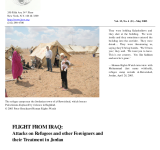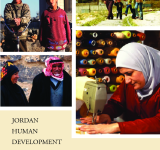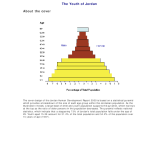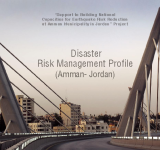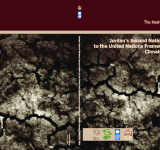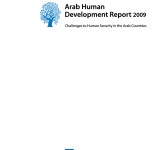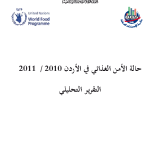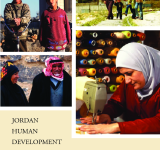Attacks and harassment amidst the security vacuum in Iraq forced refugees and other foreigners to flee the country and become refugees again;; this time in Jordan. Based on research in Baghdad and Jordan;; this 22-page Human Rights Watch report details the abuses against refugees and foreigners in Iraq;; as well as their treatment upon arrival in Jordan. Housing is frequently the pretext for the violence and harassment. Many landlords;; forced by the previous government to take Palestinian tenants at discounted rates;; are taking advantage of the breakdown in law and order to evict Palestinian tenants from their homes or to extort unrealistic rent increases from them. In other cases;; violence and threats have come from individuals who seem to have no legitimate claim to the property. Human Rights Watch criticized Jordanian authorities for limiting refugees' entry to Jordan and recommended that Jordan provide immediate protection and assistance to all refugees;; including those currently trapped near the Jordanian border in accordance with international refugee law standards.
vulnerability
This report consists of eight chapters and aims to summarise the key concepts of human development. It introduces the Human Development Index;; provides an overview of Jordan's human development achievements;; examines the regional vulnerability context that has constrained Jordan's options in its pursuit of social and economic development;; provides a platform for the poor to express their views and perceptions in relation to their poverty status;; reviews the policies;; institutions and processes that affect the poor;; examines the government's attempts to stimulate entrepreneurialism;; promotes the application of a rights-based approach;; in which all citizen are equally empowered and have the capacity and the appropriate enabling environment that allows them to claim their entitlements according to law. Finally;; the study examines the various reform initiatives in progress and assesses the extent to which Jordan is committed to the process.
This first Jordanian National Human Development Report focuses on the condition and role of young people in the country;; arguing that the capacity of young Jordanians to contribute to national development and to compete in the global economy will determine whether Jordan remains a low middle income country or joins the ranks of the world's advanced economies. The Report looks at young people's lives and aspirations in the three key areas of education;; employment and social integration;; finding for example that 60% of all unemployed people are below that age of 25. The Report concludes that although Jordan has made significant advances in building people's capabilities;; there is room for improvement in aspects of gender-equality;; employment;; income and quality and relevance of education;; and ends with a substantial section on policy recommendations suggesting strategies for addressing this shortfall
This report was prepared by the General Directorate of Civil Defense and the United Nations Development Programme in 2008. It provides an overview of Jordan and its demographic;; economic;; social and cultural characteristics. In addition it presents legislation and its effectiveness;; relevant to land use management;; vulnerability to hazards and the disaster risk management arrangements in place. It concludes with the disaster risk management vision of Jordan.
This report is the result of the long;; tedious and creative work of many Jordanian experts who together have reflected the most comprehensive outlook about climate change in the Jordanian context and outlined Jordan’s efforts in addressing the phenomena and the impacts of climate change. Whether in greenhouse gas inventory;; adaptation and mitigation options the readers of this report will find answers about Jordan’s minor contribution in emissions and major vulnerability to climate change impacts
The fifth volume in the series of Arab Human Development Reports sponsored by the United Nations Development Programme and independently authored by intellectuals and scholars from Arab countries. The report argues that human security is a prerequisite for human development;; and that the widespread absence of human security in Arab countries undermines people's options.
يتضمن نتائج مسح الأمن الغذائي الذي أجرته الدائرة كمسح مصاحب لمسح نفقات ودخل الأسرة والذي نفذ خلال الفترة 1/4/2010 – 31/3/2011 ;; على عينة من الأسر بلغ حجمها حوالي 13 ألف أسرة ممثلة للمستوى الوطني;; الحضر والريف وكافة محافظات المملكة وعلى مستوى القضاء. يهدف هذا التقرير إلى التعرف على حالة الأمن الغذائي في الأردن;; وتحديد مناطق إنعدام الأمن الغذائي والهشاشة على مستوى الأقضية;; كما يمكن من خلال هذا التقرير التعرف على الأوضاع المعيشية لهذه الأسر كالخصائص الديموغرافية والدخل والإنفاق;; مما يساعد صانعي القرارات في استهداف الفئات المحتاجة وتوجيه الأنشطة لبناء شبكة حماية للأمن الغذائي.
Many reports talk about poverty and the poor;; but few actually provide the space for the poor themselves to take centre stage and to talk about their lives. Jordan’s second National Human Development Report redresses this imbalance. It places the poor at the centre of analysis and attempts to capture the diverse and dynamic characteristics of poverty through the eyes of the poor themselves. A major theme of the report is that the considerable human development gains that have been achieved at the macro-level in Jordan have yet to trickle down to many sub-groups among the poor. The report provides detailed recommendations to accelerate this process and to enhance positive outcomes for the poor.
